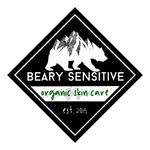It’s Beary important to know what you are putting in and on your body. Did you know that the skin on your body is your largest organ and accounts for about 10% of your body mass? Did you also know that harmful chemicals applied topically to your body can cause as much harm as those ingested?
Let’s discuss the way these chemicals can get into your body….
· Intracellular: The chemical penetrates between your cells or connects your cells
· Intercellular: The chemical weaves around the cells
· Transappendageal: The chemical is transplanted by way of hair follicles or sweat glands
With that being said let’s start from the Beary beginning with soaps…..
I wanted to start with soaps because we all take showers and wash our hands. And if you’re anything like me you wash your hands often. So, it’s easy to say that it’s important to know what’s in the soaps. Let’s start with the 3 main ingredients we all should look out for and avoid.
1. Parabens
Parabens are those hidden ingredients that are found in a lot of soaps and cosmetic products today. Many companies use parabens because it helps to elongate the shelf life of products. We can all think of reasons why companies feel this is a good idea. However, lets discuss why it’s not. It’s a bad idea because by it being a foreign preservative it has side effects like mimicking hormones. Mimicking hormones can lead to estrogen problems, reproductive issues and early onset of puberty
2. Synthetic/Artificial Colors
Synthetic colors are commonly used to enhance and create desired colors. Of course we all love the tiffany blue or the emerald green, but if we can’t find them in nature they make them. Doesn’t sound harmful right? However, these synthetic colors can lead to many problems from skin irritation to behavioral problems. If you’re not sure how to tell if a soap has synthetic colors look for labels that say “D&C” or (Red 40, Yellow 30, etc.) Basically anything that doesn’t say natural colors only.
3. Fragrances/Perfume
We all love a good smelling product but be careful in what you choose to smell good. The term “fragrance” may not seem like it’s that harmful but you have to be wary. The caution comes into play because companies don’t have to outright display what makes the fragrance. Many fragrances can contain chemicals that cause skin irritants, allergies, reproductive issues and respiratory problems. Scientists have even said some artificial fragrances or perfumes are neurological toxins that can cause an immediate reaction when sensed by your brain. I hope one day this is better regulated but until then choose products that say natural fragrance, or essential oils.
With this new knowledge, are you still willing to proceed with using these harmful chemicals? If your answer is ‘NO’ then hit ‘Shop’ and go make your Beary Sensitive purchase today!
References
Feingold.com
Huffpost.com

